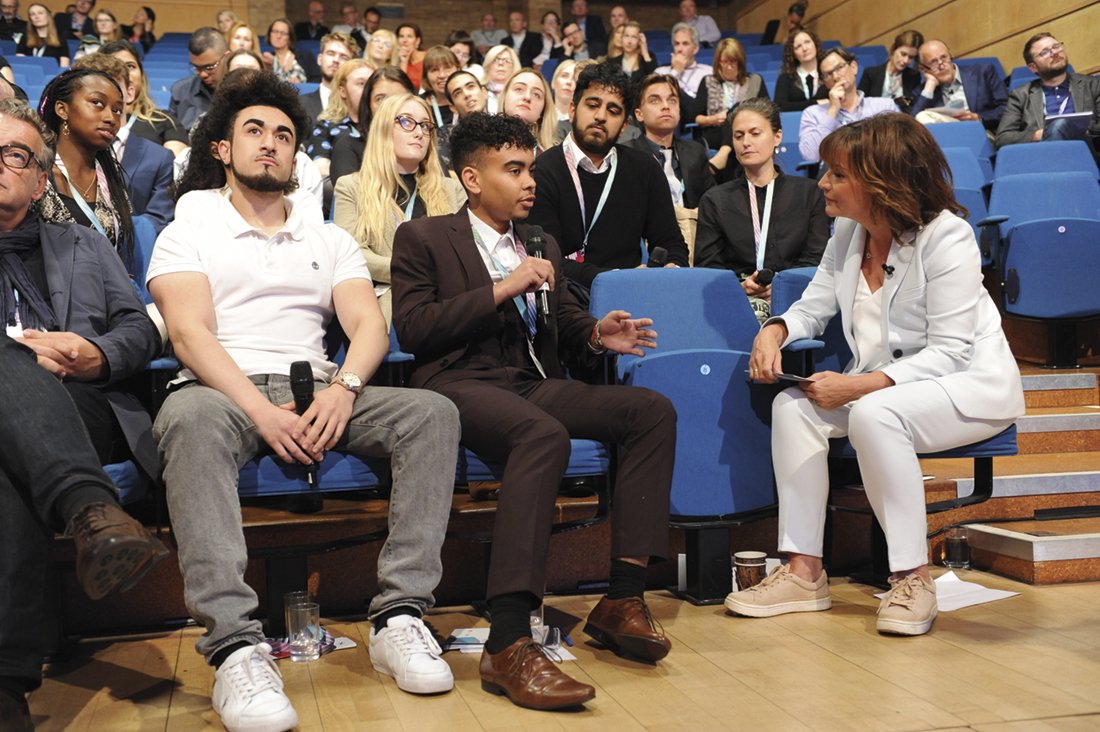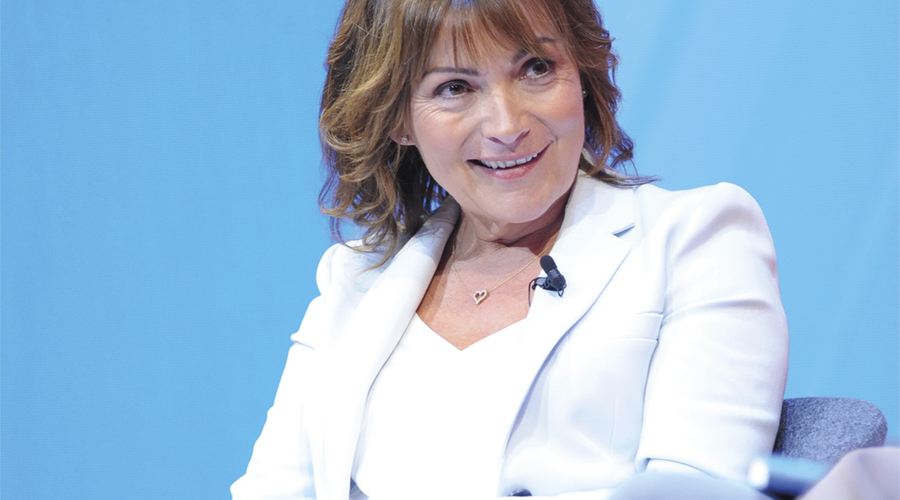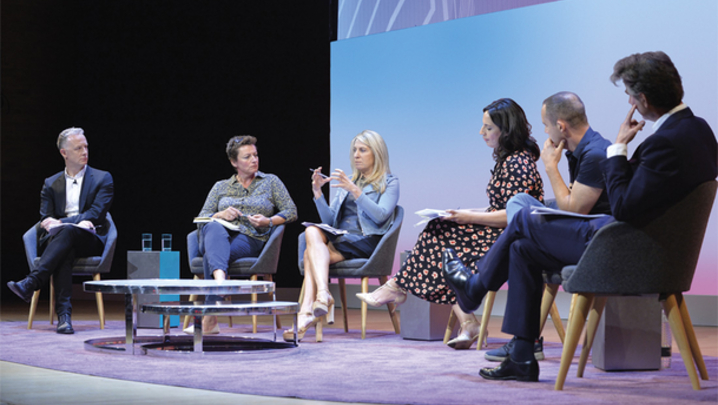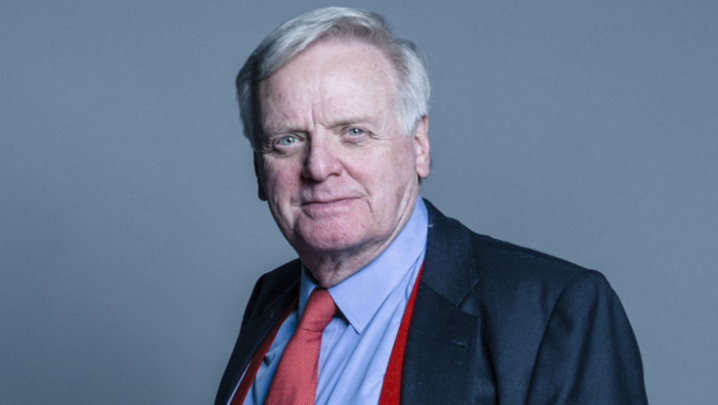What will it take to end working-class exclusion from positions of influence in the media, asks Lorraine Kelly
Veteran presenter Lorraine Kelly led a storming session on the challenge of social mobility in the TV industry, telling the Cambridge audience it was “a miracle I’m standing here talking to you”.
Thirty-five years after the Scottish presenter first appeared on our screens, she remembered: “My TV career was almost over before it began. Being working class when I started out meant a lot of doors in telly were firmly closed to me.”
Born and raised in the Gorbals, in Glasgow’s East End, the daughter of a TV repair man, Kelly gave up the chance to be the first in her family to go to university. Instead, she applied for a job on a newspaper. She got her first TV break in 1983 as a researcher at BBC Scotland.
Once she made it into the industry, she still found the career path for someone of her background heavy-going. She was constantly sent out to do vox pops, and recalled being told: “Punters will talk to you. You’re one of them.”
And one particular comment brought home to her the continuing class divide. When she was auditioned for a reporter’s job, she was told: “You’re never going to make it in television. Your accent is appalling.”
Instead, she made it on to the screen the following year as Scotland correspondent with ITV breakfast station TV-am. There, she credited her Australian boss (Bruce Gyngell) for being open-minded enough to give her a go: “Australians don’t care about class.”
She also cited one former news editor, a working-class Northerner, as “a champion of reporters who were working class, because he was himself, and he wanted to give us a hand up”.
She added: “I think that’s what we should all be doing.”
Despite her longevity in the industry, Kelly said her background had always made her feel on the outside looking in, even to this day. Once, when she and her colleagues were apportioned responsibilities for a travel segment, “one got a trip on Concorde, one went to the Seychelles, and I got sent on a coach trip with old-age pensioners to Bavaria. It’s tough to shake that off.”

Producers’ prejudices extended to planning meetings, she said. “My audiences were referred to as Tracey Towerblock – so patronising. Not everyone has a car or a garden, not everyone can afford to go on holiday abroad, but I would never patronise my audience.”
With her star status long established, Kelly has clearly proved those early doubters wrong. “I’m proud of where I’m from, and I think it’s my best asset,” she said. “Where I’m from has certainly helped me to be better at the sort of job I do.”
However, she stressed her concern that stories such as hers were few and far between, with the industry’s doors remaining closed to many.
During the session she introduced several students on the RTS bursary scheme, which supports young people from less well-off backgrounds.
Among then was Sarah, a mum from Northern Ireland living on benefits. She explained: “Your parents have a tendency to want you to go into an office job and make money, because that seems more logical.”
Determined to pursue her dream of working in TV, Sarah found her path blocked by a lack of contacts. Instead she turned to waitressing jobs.
It was only with the help of the bursary initiative that she felt able to return to education: “I feel part of the family, I feel supported.”
Sarah will be given a mentor in her second year of study. While her ultimate dream was to produce, she added: “I’d love to have as many strings as possible to my bow.”
Another bursary student, Donald, from Stirling, said he suffered from a lack of role models in TV journalism because of his ethnic background.
With the exception of George Alagiah and Clive Myrie, he reflected, “there aren’t really people who you can see who have worked their way in, not through the elitist university system.
“You need to change the theme to someone who encourages diversity, someone who encourages people from different backgrounds to want to get into the industry.”
However, he added that gaining a RTS bursary had given him hope. “Before, journalism in television wasn’t really an opportunity for me. Now, I see this industry as [more] welcoming, and hopefully getting more diverse. It’s really positive.”
Alan Clements, Managing Director of Black Pepper Media, took part in a similar panel at Cambridge two years ago. He was asked by Kelly if anything had changed. “We’re slowly making progress, but it’s nothing like enough,” he replied. “We have to do something more structural to change things.” And he referred to the London-weighted commissioning hubs. “We are never going to truly solve the social-mobility issue in this industry until we solve the geography issue.
"Don’t pull the ladder [up behind you], help that person up"
“People follow the power and people follow the money. If the people who sign the cheques and all the role models are in London, then they can’t possibly know the society that they’re meant to be representing. So we have to do something much more revolutionary and fundamental.”
Clements, who shares Glaswegian roots with Kelly, credited the four years he spent as a young man in the US for gaining the confidence he needed to start his own company. “It’s a redemptive story for them: you go from the council estate to the Ivy League, and it shows the American dream is alive and well. I don’t think we celebrate that in British culture.”
Ofcom’s director of content and media policy, Vikki Cook, told delegates that, while she welcomed aspirational targets across the industry, she was concerned by the prospect of more schemes designed to bring one or two new faces into an organisation.
She said: “I’m really keen that we don’t get diversity fatigue. I want us to look at inclusion – it’s about culture, it’s about how to change this industry, so it really looks and sounds like the audiences it’s broadcasting to.”
She added: “I don’t think there’s a chief executive who’s spoken at this conference who doesn’t get it. You’ve got the entry level, where there’s an awful lot of focus, and you have this frozen middle. That’s what we need to thaw out quickly and focus on.”
She agreed with Clements’ point regarding spreading the power beyond the UK capital: “The focus has to be on how we address a more inclusive culture. The geographical footprint is absolutely crucial.”
Kelly mentioned the additional importance of mentoring, both for feedback and support, remembering the help she received. “It wasn’t structured, there was just that fellow that helped you out, and that’s what I try to do in my job. Don’t pull the ladder [up behind you], help that person up.”
Clements agreed: “It’s about saying to every single senior person in the industry that they should mentor someone from a hard-to-reach background. If every single person made that commitment, it would make a massive difference.”
Session Sixteen, ‘Blow the bloody doors off’, featured Lorraine Kelly, journalist and broadcaster. The panellists were Alan Clements, Managing Director, Black Pepper Media, and Vikki Cook, director, content and media policy, Ofcom. The producer was Emma Gormley. Report by Caroline Frost.







